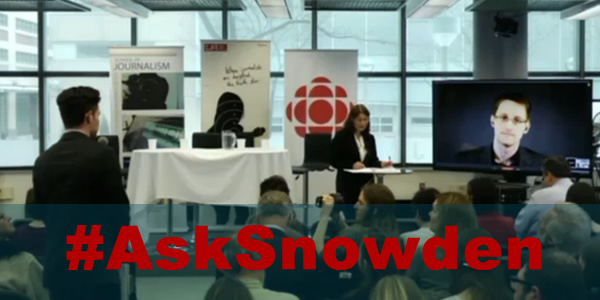Our comprehensive report on surveillance in Canada is available. Download it here.
#AskSnowden: Privacy, Ethics, Bill C-51 & Mass Surveillance
- March 8, 2015
 Michael Carter, PhD student at Queen's University, speaks with Edward Snowden
Michael Carter, PhD student at Queen's University, speaks with Edward Snowden
The #AskSnowden event, hosted by CBC News, the Canadian Journalists for Free Expression (CJFE) and Ryerson University on March 2, offered a rare opportunity to engage with Edward Snowden. Anna Maria Tremonti, host of CBC Radio’s The Current and CJFE Board Member, moderated the discussion. Snowden fielded questions from Twitter via the hashtag #AskSnowden and from members of the audience. Prominent themes in the discussion included privacy concerns, the ethics of both mass surveillance and computer hacking, and Bill C-51. The launch of the first searchable database of the files leaked by Snowden was also announced. Following the Q&A, Anna Maria Tremonti moderated a panel discussion that included: Dave Seglins of the CBC; Dr. Andrew Clement, Professor, Faculty of Information, University of Toronto; and Laura Tribe, CJFE.
When asked by Michael Carter, PhD student at Queen’s University, about his personal experiences of privacy since releasing the files, Snowden replied ‘there is no way to really feel safe.’ He pointed to the vast resources of intelligence agencies as good reason for not being able to trust electronic communication. Snowden then expressed concern that government demand for weakened security of communications between citizens, which facilitates mass surveillance by the state, also reduces the barriers for cyber criminals. A later question, submitted via Twitter, asked Snowden for advice on protecting personal communication from the mass surveillance practices of intelligence agencies. He suggested that while it is not possible to fully prevent the exploitation of electronic communication, the use of ‘end to end encryption tools’ that protect messages in transit between devices is beneficial. Snowden mentioned Spideroak, RedPhone and TextSecure as plausible options.
In response to being asked if mass surveillance was effective for identifying lone terrorists Snowden offered a firm no. He further problematized mass surveillance by pointing out that it is conducted without a specific target in mind. Thus, citizens are subjected to ongoing collection of private information without just cause and without being informed. Snowden built on these points in his critique of Bill C-51, which he referred to as “an emulation of the American Patriot Act”. He suggested the legislation would further erode freedom and liberty without offering increased protection from terrorist acts, a trade off he felt the majority of citizens would be unwilling to make.
Peter Vogel (@petervogel) submitted a question via Twitter asking for advice for students in his high school ICT courses that are considering a career in computer security. Snowden offered practical advice by suggesting that regular practice is a must in a climate where what is taught in classrooms is outdated by graduation. He then spoke to the ethics of computer security, claiming that hacking is not a ‘black art’; rather it is what individuals do with knowledge about system weaknesses that determines if they are working for the benefit of society or to its detriment. Snowden underscored the importance of ethics as the hacking power wielded by members of the public continues to rise, which he illustrated with the recent hacking of an NSA website by a handful of graduate students.
The launch of the Snowden Surveillance Archive was highlighted throughout the event. The archive was designed and built by George Raine, a recent masters student at the University of Toronto and supported by CJFE, the Surveillance Studies Centre at Queen’s University, The Digital Curation Institute at the University of Toronto and the Centre for Freedom of Expression at Ryerson University. Anna Maria Tremonti asked Snowden what his hopes for the archive were. He suggested that in addition to interpretations offered by journalists, researchers and technicians desire a deeper analysis, which is made possible through access to the source documents. He also felt that having the source documents empowers people to question the merits of surveillance practices conducted by intelligence agencies.
Throughout the discussion Snowden was clearly critical of mass surveillance practices. He expressed his position quite simply when he said, “If you collect everything on everybody you don’t really understand anything about it.” He argued that knowledge of surveillance activity does not deter criminals from communicating, evidenced by the amount of telephone data that continues to be presented in criminal courts despite it being well known that wiretaps are commonly used. He asserted that mass surveillance mainly results in the indiscriminate collection of information about the personal lives of all citizens without their consent. This lack of awareness held by citizens was also a recurrent theme in Snowden’s responses. The full interview is available online at https://cjfe.org/blog/snowden-live-canada-and-security-state.





